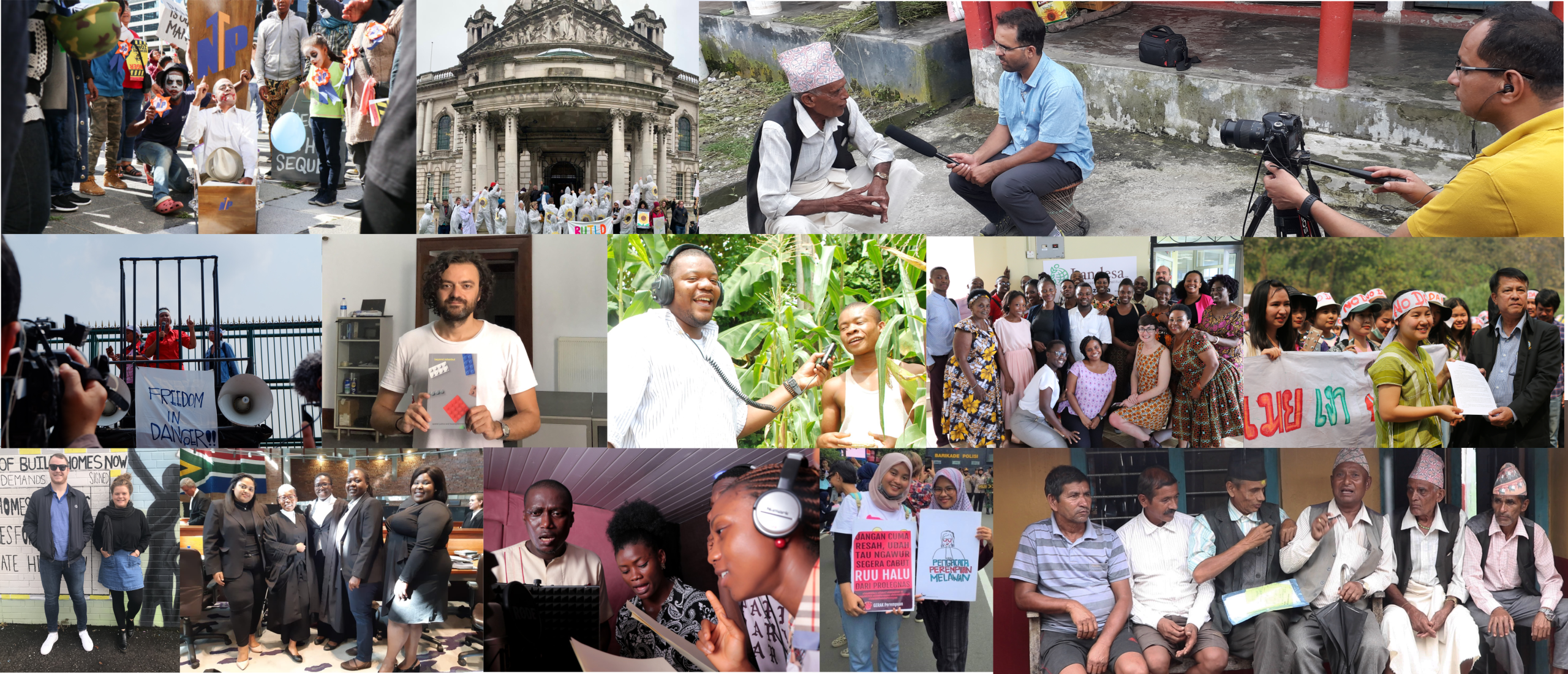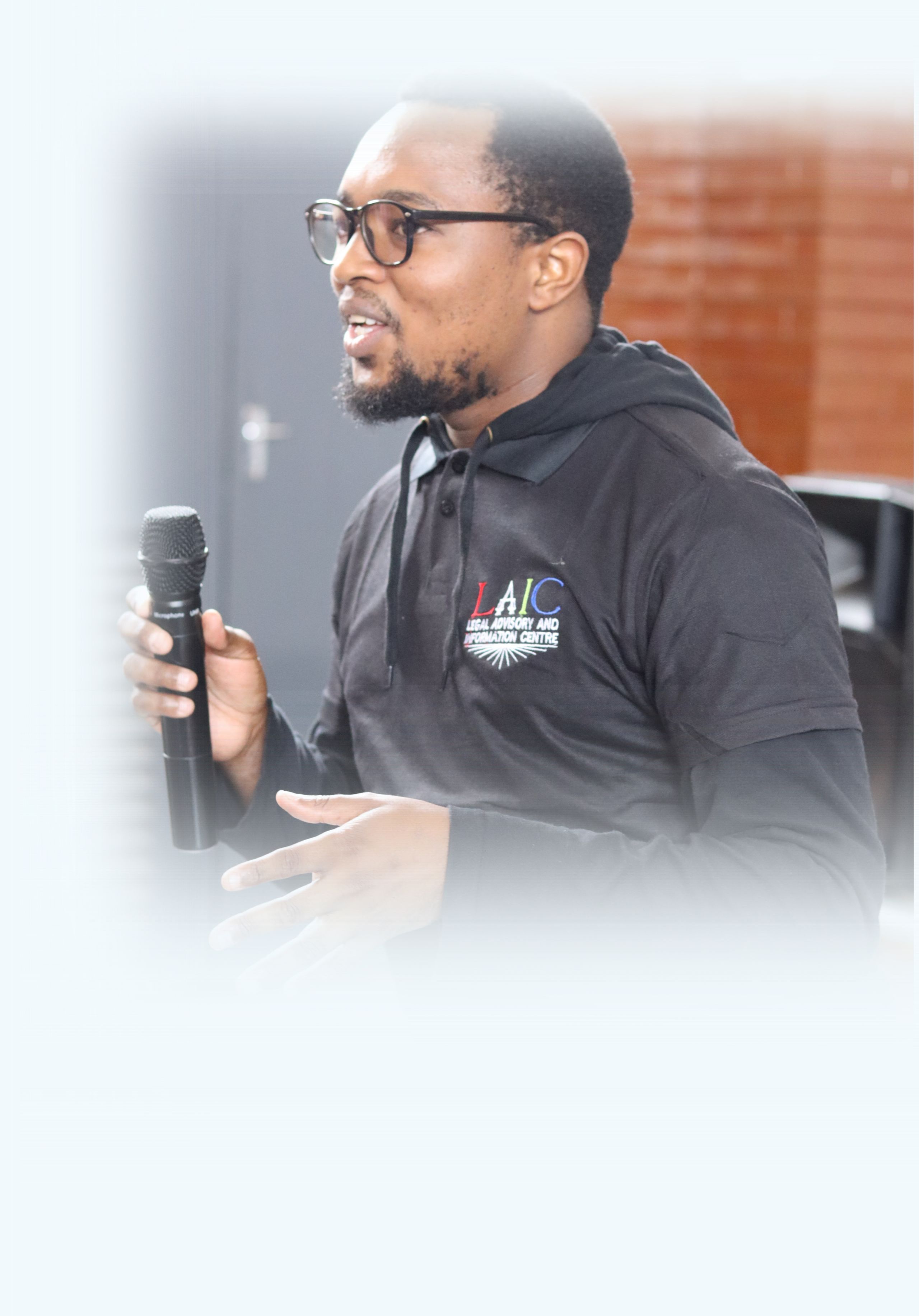Lindokuhle “Linda” Mdabe
South Africa

Lindokuhle Mdabe’s Bertha Justice Fellowship experience and work with SERI energized his human rights and movement lawyering journey – and catalyzed the establishment of the Bertha-supported Legal Advisory and Information Centre.
Lindokuhle “Linda” Mdabe started his human rights and movement lawyering career in 2012 as a Bertha Justice Fellow based at the Socio-Economic Rights Institute (SERI) in Johannesburg. There, he was central in mobilizing communities SERI represented on issues pertaining to housing, access to basic services and informal settlements.
The Fellowship made its mark, Linda says. “I was able to join a network of young human rights and movement lawyers across the world as part of the Bertha Fellowship. This network contributed immensely to my growth as a lawyer and activist. These convenings were powerful moments of pause and reflection, self-introspection, encouragement, inspiration and cause-searching. I was able to draw strength from the fact that there is a network of lawyers around the world who are doing good. This network served as an entry point for information sharing and coordination of advocacy strategies.” After his Fellowship, he was hired by SERI as a staff lawyer and committed time to supporting many Bertha Justice convenings.
Lindokuhle “Linda” Mdabe started his human rights and movement lawyering career in 2012 as a Bertha Justice Fellow based at the Socio-Economic Rights Institute (SERI) in Johannesburg. There, he was central in mobilizing communities SERI represented on issues pertaining to housing, access to basic services and informal settlements.
The Fellowship made its mark, Linda says. “I was able to join a network of young human rights and movement lawyers across the world as part of the Bertha Fellowship. This network contributed immensely to my growth as a lawyer and activist. These convenings were powerful moments of pause and reflection, self-introspection, encouragement, inspiration and cause-searching. I was able to draw strength from the fact that there is a network of lawyers around the world who are doing good. This network served as an entry point for information sharing and coordination of advocacy strategies.” After his Fellowship, he was hired by SERI as a staff lawyer and committed time to supporting many Bertha Justice convenings.
Continuing on this journey, in 2018 Linda co- founded the Legal Advisory and Information Centre (LAIC) with fellow lawyer Siphiwe Brian Nkosi in South Africa. LAIC’s mission is to ensure that legal advocacy and education is accessible to local communities to help them achieve secured housing and land tenure rights. LAIC has highlighted the complicated land and housing history interwoven in the histories of Johannesburg and Soweto. From the discovery of gold in the late 19th century to the site of the 1976 Soweto uprising and finally post-transition into democracy, there have been over 100 years of complex land and housing laws and policies for people to navigate.
Continuing on this journey, in 2018 Linda co- founded the Legal Advisory and Information Centre (LAIC) with fellow lawyer Siphiwe Brian Nkosi in South Africa. LAIC’s mission is to ensure that legal advocacy and education is accessible to local communities to help them achieve secured housing and land tenure rights. LAIC has highlighted the complicated land and housing history interwoven in the histories of Johannesburg and Soweto. From the discovery of gold in the late 19th century to the site of the 1976 Soweto uprising and finally post-transition into democracy, there have been over 100 years of complex land and housing laws and policies for people to navigate.
When Linda reached out to Bertha Foundation to describe his vision for this organization, it resonated with Bertha’s movement lawyering approach, and Bertha proudly provided seed funding. With years of invaluable experience in this field, Linda and the team at LAIC use a combination of research, public education and training, advocacy and public interest litigation. Their research is community-based and client-oriented. They focus on the economic, social and legal value of land tenure for vulnerable communities in urban areas like Soweto. This research is built into community training in order to improve people’s legal and policy knowledge and is reported back to communities so they can formulate their own community-based Theories of Change.


When Linda reached out to Bertha Foundation to describe his vision for this organization, it resonated with Bertha’s movement lawyering approach, and Bertha proudly provided seed funding. With years of invaluable experience in this field, Linda and the team at LAIC use a combination of research, public education and training, advocacy and public interest litigation. Their research is community-based and client-oriented. They focus on the economic, social and legal value of land tenure for vulnerable communities in urban areas like Soweto. This research is built into community training in order to improve people’s legal and policy knowledge and is reported back to communities so they can formulate their own community-based Theories of Change.
LAIC’s public interest litigation is solely influenced by affected communities and forms part of a broader political mobilization to shape public discourse on land tenure rights and access to adequate housing: they seek to amplify community voices through court processes. However, shaping public discourse takes a lot more than litigation. Strategies include using social media, television interviews, submissions to national parliament, newspaper articles, public education, workshops, seminars, research reports, guides, legal policy monitoring and evaluation toolkits. Communities can independently use many of these as tools to inform their negotiations with local government.
Linda and the team are working many cases in Johannesburg and the Gauteng province, and recently LAIC has begun a partnership with the communities of Phoenix in Durban, KwaZulu-Natal. Linda’s rich experience borne from the Fellowship embodies Bertha’s vision to train the next generation of social justice and movement lawyers.
Eight years after his Fellowship, Linda and LAIC’s lawyers remain a critical part of the movement for change – one settlement and one city at a time.
LAIC’s public interest litigation is solely influenced by affected communities and forms part of a broader political mobilization to shape public discourse on land tenure rights and access to adequate housing: they seek to amplify community voices through court processes. However, shaping public discourse takes a lot more than litigation. Strategies include using social media, television interviews, submissions to national parliament, newspaper articles, public education, workshops, seminars, research reports, guides, legal policy monitoring and evaluation toolkits. Communities can independently use many of these as tools to inform their negotiations with local government.
Linda and the team are working many cases in Johannesburg and the Gauteng province, and recently LAIC has begun a partnership with the communities of Phoenix in Durban, KwaZulu-Natal. Linda’s rich experience borne from the Fellowship embodies Bertha’s vision to train the next generation of social justice and movement lawyers.
Eight years after his Fellowship, Linda and LAIC’s lawyers remain a critical part of the movement for change – one settlement and one city at a time.
CREDITS
Photo 1: Linda Mdabe speaking at a community workshop in March 2020. Image: LAIC/Sizwe Nkosi
Author: Shveta Shah, Program Director, Bertha Justice Initiative
Editorial Consultant: Karen Frances Eng
This story was originally published in the Bertha Fellows book and some of the information in this story may have changed since it was first published.


 Built with Shorthand
Built with Shorthand